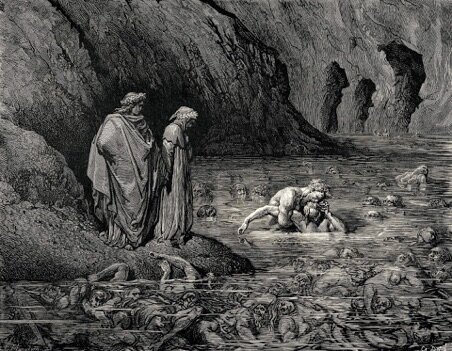HELL AND BACK
In A Playboy’s Life, Anthony Valerio tells the story of an ordinary man who, almost without effort, finds himself in an extraordinary situation. This lively and skillfully written biography takes as its subject John Aimola, a son of Italian immigrants who renames himself John Dante and begins an intense relationship with Hugh Hefner, founder of the Playboy brand. The fascinating part of this book is the way Valerio relates John’s life to the great epic poem of his literary idol, Dante Alighieri, whose Inferno is based on the concept that the punishment for sin would resemble the sin itself.

John was born to immigrants who settled in Chicago in the early 1900’s. The family wanted their son to avoid the street gangs and mobsters in the Italian section where they lived and sent him to a boarding school run by Benedictine monks. The monks taught The Divine Comedy, the poem about a pilgrim – Dante himself – who must journey through Hell’s inferno before he can attain Paradise. At the school one monk would read the poem in Italian while another used a pull down screen to flash Gustav Dore’s famous illustrations of sinners in the circles of Hell.
As John grows older he never forgets the monks’ lessons while at the same time he becomes aware after some early sexual encounters that he is attractive to women. John is handsome and good natured and smart and easy to like. After a brief stint in organized crime, and a short career as a bartender, he opens a night club in a poor area of Chicago and calls it Dante’s Inferno. He decorates the walls with Doré reproductions and places ads in Playboy – a magazine he read and collected. One night a curious Hugh Hefner arrives at the club and John Aimola introduces himself as John Dante. Hefner likes him at once and the meeting begins a decades-long friendship which ends when the two men grow older and the Playboy phenomenon subsides.
Hefner hires John as a bartender and soon promotes him to manager of the Playboy club in Chicago. John is responsible for hiring not only the help but also the Bunnies. Later he would manage other Playboy clubs stateside and in England as the Playboy lifestyle catches on. John is given an apartment in the Playboy mansion and falls under the sway of Hefner and his hyper-sexual world. As a resident of the mansion and part of Hefner’s in-group, John meets and befriends not only the powerful men who pass through, but a train of women willing to provide sex to advance their careers, or simply to join the party. The artists and actors, the gangsters and their women, all touch John’s life, but none more than Hefner himself. The two men will take part in any number of orgies in Hefner’s bedroom. The group sex will include John, Hefner, often one or two male friends, but always more women than men. At a certain point the group sex turns ambiguous, the borders of acceptable male heterosexuality between the two men become porous, and John, who still retains his old world values, withdraws.
This might be a book about sex if not for Valerio’s ability to plumb John’s mind and reawaken him to Dante Alighieri’s system of sin and punishment, something John has put aside until the Playboy life comes to its inevitable end, with age, with the death of his parents, and his own self-questioning. The end is hastened as Hefner himself grows older. Lines have been crossed between the two men. One day, and without telling Hefner, John packs the battered suitcase his mother brought from Italy and drives to Florida, consciously thinking of the dignity he’s lost and what he has to preserve. He settles into a rundown bungalow in Fort Lauderdale and wants to write a book about his life called Guest at the Party. His dream is to retire in Florence with the proceeds and to spend his last years in the city where his counterpart wrote the poem whose world mirrored his own. Valerio writes the biography for him, but John dies before his dream is realized.
As Dante Alighieri peopled Hell with his contemporaries as exemplars of sin, Valerio presents John’s world in the same terms. It is Valerio’s genius to imply that humankind in our time has not changed, and those who live in excess, those who betray the public trust, have places in the underworld if only in our imaginings.
End notes: Anthony Valerio is the author of eight books of fiction and nonfiction. His books are available online and from small presses. His short stories have appeared in the Paris Review and several anthologies. He lectures widely in the United States and in Europe and has taught writing at NYU, CUNY, and Wesleyan University.

Recent Comments